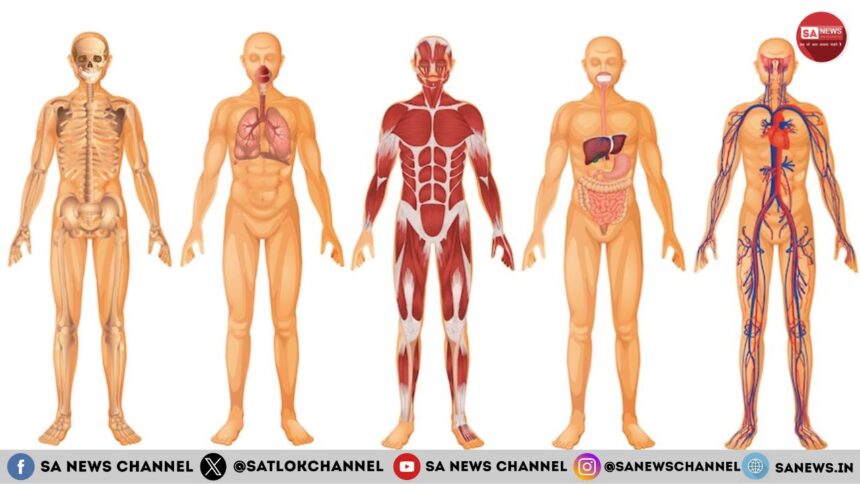The human body is an intricate system composed of various structures that work together to maintain health and support life. Each structure has a specific function, from the cardiovascular system that circulates blood to the nervous system that controls bodily processes. This guide provides a comprehensive look at these essential systems, exploring their functions, interactions, and importance to overall health.
- Highlights
- Introduction to the Human Body Systems
- The Cardiovascular System
- The Respiratory System
- The Nervous System
- The Digestive System
- The Muscular System
- The Skeletal System
- The Immune System
- The Endocrine System
- How Body Systems Work Together
- Create Balance of Mind, Body and Soul
- FAQs
- Q.What are the critical systems of the human body?
- Q.How do the respiratory and cardiovascular systems work together?
- Q.Why is the nervous system important?
- Q.What is homeostasis?
- Q.How can we maintain a healthy body system?
- Connect With Us on the Following Social Media Platforms
Highlights
- The human body is composed of various interconnected systems that support life.
- Key systems include the cardiovascular, respiratory, nervous, digestive, muscular, and skeletal systems.
- Each system has unique functions, such as oxygen transport, nutrient absorption, and coordination of physical movements.
- These systems work together to maintain homeostasis and overall health.
- Understanding these systems is essential for promoting health and preventing disease.
Introduction to the Human Body Systems
The human body is a highly organized network of systems that perform essential roles necessary for survival. These systems, such as the cardiovascular, respiratory, and nervous systems, collaborate to maintain balance, known as homeostasis. Each system plays a specific role in ensuring the body functions smoothly.
The Cardiovascular System
Function of the Cardiovascular System
The cardiovascular system, also known as the circulatory system, is responsible for pumping blood throughout the body. It includes the heart, blood vessels, and blood. This system transports oxygen, nutrients, hormones, and waste products to and from cells.
Also Read: Unnoticed Miracle of God: The Human Physiology and Anatomy
Importance of the Cardiovascular System
This system is crucial for sustaining life by ensuring that oxygen-rich blood reaches every organ and tissue. Without the cardiovascular system, the body would be unable to transport essential nutrients or effectively remove waste.
The Respiratory System
Function of the Respiratory System
The respiratory system allows us to breathe by facilitating the exchange of oxygen and carbon dioxide. It includes the lungs, trachea, and diaphragm. Oxygen is inhaled, while carbon dioxide, a waste product, is exhaled.
Importance of the Respiratory System
Oxygen is essential for cellular respiration, the process that produces energy for cells to function. Without oxygen, cells cannot perform their tasks, making the respiratory system vital for energy production and overall health.
The Nervous System
Function of the Nervous System
The nervous system is the body’s communication network. It consists of the brain, spinal cord, and nerves, controlling every action, from voluntary movements to involuntary processes like heartbeat and digestion. The nervous system transmits signals between different parts of the body and processes sensory information.
Importance of the Nervous System
This system enables complex processes like thought, memory, emotion, and movement. It also regulates vital processes such as breathing, digestion, and circulation, making it essential for survival.
The Digestive System
Function of the Digestive System
The digestive system is responsible for breaking down food into nutrients that the body can absorb. It includes the mouth, stomach, intestines, liver, and pancreas. Nutrients from food are absorbed into the circulatory system, providing energy and building blocks for cells.
Importance of the Digestive System
Without the digestive system, the body would be unable to obtain the nutrients it needs to function. It is essential for digestion, energy production, and waste elimination.
The Muscular System
Function of the Muscular System
The muscular system allows movement by contracting and relaxing muscles. It is composed of three types of muscles: skeletal, smooth, and cardiac. Skeletal muscles enable voluntary movements, smooth muscles control involuntary actions like digestion, and cardiac muscles pump blood throughout the body.
Importance of the Muscular System
This system is crucial for movement, strength, and blood circulation. It also plays a role in maintaining posture and regulating internal body temperature.
The Skeletal System
Function of the Skeletal System
The skeletal system provides structural support for the body. It consists of bones, cartilage, and ligaments. It also protects vital organs, produces blood cells, and stores minerals like calcium.
Importance of the Skeletal System
Without the skeletal system, the body would lack shape and flexibility. Additionally, it plays a critical role in protecting the brain, heart, and other vital organs from injury.
The Immune System
Function of the Immune System
The immune system protects the body against pathogens like bacteria, viruses, and parasites. It includes white blood cells, lymph nodes, and the spleen, which work together to detect and eliminate harmful invaders.
Importance of the Immune System
A healthy immune system is essential for preventing infections and diseases. It helps the body recover from illnesses and ensures long-term health.
The Endocrine System
Function of the Endocrine System
The endocrine system consists of glands that produce hormones, which regulate processes such as growth, metabolism, and reproduction. Key glands include the thyroid, pancreas, and adrenal glands.
Importance of the Endocrine System
Hormones play a critical role in maintaining balance within the body, influencing how organs function and respond to changes. A well-regulated endocrine system ensures proper growth and metabolism.
How Body Systems Work Together
Homeostasis and Interdependence
No single body system works in isolation. For example, the respiratory and cardiovascular systems collaborate to deliver oxygen to tissues, while the nervous and muscular systems work together to produce movement. This interconnection is essential for maintaining homeostasis and overall health.
Create Balance of Mind, Body and Soul
Just as the systems in our body work together to keep us alive, life itself requires harmony and cooperation. When we nurture every aspect of our lives—mind, body, and soul—we create balance and thrive. Similarly, the body needs care and attention to stay healthy, as do our relationships, goals, and inner peace.
The present day the only one enlightened Sant Rampal Ji Maharaj gives a simple solution of harmony and peace of mind, body and sou. It is by chanting true salvation mantras, that is central to Sahaj Samadhi meditation. Such meditation maintains a connection with the Supreme God through devoted thoughts and actions. For this there a set of rules leading a life aligned with divine principles to attain genuine inner peace, self-discovery, and lasting tranquility.
FAQs
Q.What are the critical systems of the human body?
A.The major systems of the human body include the cardiovascular, respiratory, nervous, digestive, muscular, skeletal, immune, and endocrine systems.
Q.How do the respiratory and cardiovascular systems work together?
A.The respiratory system provides oxygen to the body, which the cardiovascular system circulates to tissues and organs through the blood.
Q.Why is the nervous system important?
A.The nervous system controls most bodily functions, including movement, thought, and maintaining the body’s internal balance.
Q.What is homeostasis?
A.Homeostasis is the body’s ability to maintain a stable internal environment, ensuring all systems function properly despite external changes.
Q.How can we maintain a healthy body system?
A.Maintaining a healthy body involves proper nutrition, regular exercise, hydration, and routine medical check-ups to ensure all systems are working optimally.









